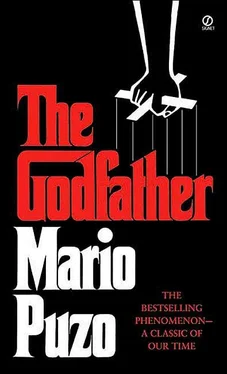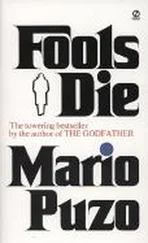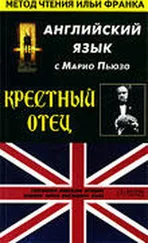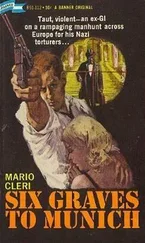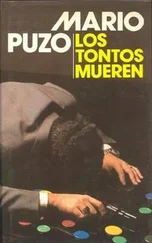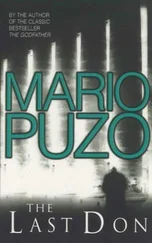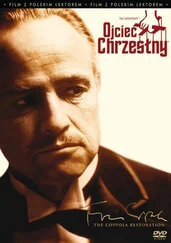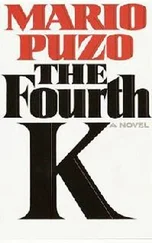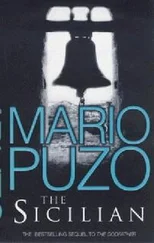She could see he was angry with her for insisting and expected him to refuse. So she was surprised when he nodded and said, “OK. But I can’t leave the mall. Tell them to arrange for the priest to confirm the kid here. I’ll pay whatever it costs. If they run into trouble with the church people, Hagen will straighten it out.”
And so the day before the meeting with the Barzini Family, Michael Corleone stood Godfather to the son of Carlo and Connie Rizzi. He presented the boy with an extremely expensive wristwatch and gold band. There was a small party in Carlo’s house, to which were invited the caporegimes, Hagen, Lampone and everyone who lived on the mall, including, of course, the Don’s widow. Connie was so overcome with emotion that she hugged and kissed her brother and Kay all during the evening. And even Carlo Rizzi became sentimental, wringing Michael’s hand and calling him Godfather at every excuse— old country style. Michael himself had never been so affable, so outgoing. Connie whispered to Kay, “I think Carlo and Mike are going to be real friends now. Something like this always brings people together.”
Kay squeezed her sister-in-law’s arm. “I’m so glad,” she said.
Albert Neri sat in his Bronx apartment and carefully brushed the blue serge of his old policeman’s uniform. He unpinned the badge and set it on the table to be polished. The regulation holster and gun were draped over a chair. This old routine of detail made him happy in some strange way, one of the few times he had felt happy since his wife had left him, nearly two years ago.
He had married Rita when she was a high school kid and he was a rookie policeman. She was shy, dark-haired, from a straitlaced Italian family who never let her stay out later than ten o’clock at night. Neri was completely in love with her, her innocence, her virtue, as well as her dark prettiness.
At first Rita Neri was fascinated by her husband. He was immensely strong and she could see people were afraid of him because of that strength and his unbending attitude toward what was right and wrong. He was rarely tactful. If he disagreed with a group’s attitude or an individual’s opinion, he kept his mouth shut or brutally spoke his contradiction. He never gave a polite agreement. He also had a true Sicilian temper and his rages could be awesome. But he was never angry with his wife.
Neri in the space of five years became one of the most feared policemen on the New York City force. Also one of the most honest. But he had his own ways of enforcing the law. He hated punks and when he saw a bunch of young rowdies making a disturbance on a street corner at night, disturbing passersby, he took quick and decisive action. He employed a physical strength that was truly extraordinary, which he himself did not fully appreciate.
One night in Central Park West he jumped out of the patrol car and lined up six punks in black silk jackets. His partner remained in the driver’s seat, not wanting to get involved, knowing Neri. The six boys, all in their late teens, had been stopping people and asking them for cigarettes in a youthfully menacing way but not doing anyone any real physical harm. They had also teased girls going by with a sexual gesture more French than American.
Neri lined them up against the stone wall that closed off Central Park from Eighth Avenue. It was twilight, but Neri carried his favorite weapon, a huge flashlight. He never bothered drawing his gun; it was never necessary. His face when he was angry was so brutally menacing, combined with his uniform, that the usual punks were cowed. These were no exception.
Neri asked the first youth in the black silk jacket, “What’s your name?” The kid answered with an Irish name. Neri told him, “Get off the street. I see you again tonight, I’ll crucify you.” He motioned with his flashlight and the youth walked quickly away. Neri followed the same procedure with the next two boys. He let them walk off. But the fourth boy gave an Italian name and smiled at Neri as if to claim some sort of kinship. Neri was unmistakably of Italian descent. Neri looked at this youth for a moment and asked superfluously, “You Italian?” The boy grinned confidently.
Neri hit him a stunning blow on the forehead with his flashlight. The boy dropped to his knees. The skin and flesh of his forehead had cracked open and blood poured down his face. But it was strictly a flesh wound. Neri said to him harshly, “You son of a bitch, you’re a disgrace to the Italians. You give us all a bad name. Get on your feet.” He gave the youth a kick in the side, not gentle, not too hard. “Get home and stay off the street. Don’t ever let me catch you wearing that jacket again either. I’ll send you to the hospital. Now get home. You’re lucky I’m not your father.”
Neri didn’t bother with the other two punks. He just booted their asses down the Avenue, telling them he didn’t want them on the street that night.
In such encounters all was done so quickly that there was no time for a crowd to gather or for someone to protest his actions. Neri would get into the patrol car and his partner would zoom it away. Of course once in a while there would be a real hard case who wanted to fight and might even pull a knife. These were truly unfortunate people. Neri would, with awesome, quick ferocity, beat them bloody and throw them into the patrol car. They would be put under arrest and charged with assaulting an officer. But usually their case would have to wait until they were discharged from the hospital.
Eventually Neri was transferred to the beat that held the United Nations building area, mainly because he had not shown his precinct sergeant the proper respect. The United Nations people with their diplomatic immunity parked their limousines all over the streets without regard to police regulations. Neri complained to the precinct and was told not to make waves, to just ignore it. But one night there was a whole side street that was impassable because of the carelessly parked autos. It was after midnight, so Neri took his huge flashlight from the patrol car and went down the street smashing windshields to smithereens. It was not easy, even for high-ranking diplomats, to get the windshields repaired in less than a few days. Protests poured into the police precinct station house demanding protection against this vandalism. After a week of windshield smashing the truth gradually hit somebody about what was actually happening and Albert Neri was transferred to Harlem.
One Sunday shortly afterward, Neri took his wife to visit his widowed sister in Brooklyn. Albert Neri had the fierce protective affection for his sister common to all Sicilians and he always visited her at least once every couple of months to make sure she was all right. She was much older than he was and had a son who was twenty. This son, Thomas, without a father’s hand, was giving trouble. He had gotten into a few minor scrapes, was running a little wild. Neri had once used his contacts on the police force to keep the youth from being charged with larceny. On that occasion he had kept his anger in check but had given his nephew a warning. “Tommy, you make my sister cry over you and I’ll straighten you out myself.” It was intended as a friendly pally-uncle warning, not really as a threat. But even though Tommy was the toughest kid in that tough Brooklyn neighborhood, he was afraid of his Uncle Al.
On this particular visit Tommy had come in very late Saturday night and was still sleeping in his room. His mother went to wake him, telling him to get dressed so that he could eat Sunday dinner with his uncle and aunt. The boy’s voice came harshly through the partly opened door, “I don’t give a shit, let me sleep,” and his mother came back out into the kitchen smiling apologetically.
Читать дальше
